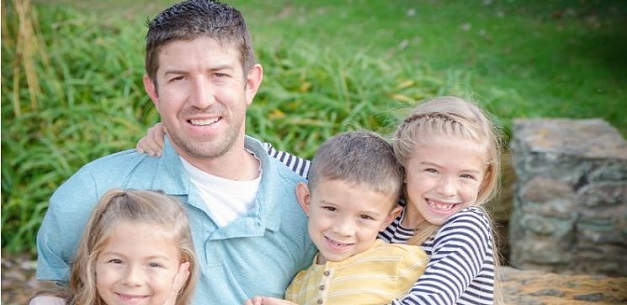At Your Service: Fatherhood, Family, and Life in the Military

"The organic resiliency that develops from the military lifestyle is not only key to adapting and overcoming struggles inherent to life on active duty, but also can often serve to bring families – and their extended communities – closer together for a lifetime," said Ryan Kules.
By Ryan Kules, Wounded Warrior Project® Combat Stress Recovery Director
As the adage goes, time is the most valuable gift a person can receive. For Father’s Day each year, my beautiful family and I celebrate simply – perhaps an afternoon at Camden Yards for an Orioles game, burgers on the grill, catching fireflies in the yard. And I wouldn’t have it any other way.
As all fathers do, I cherish the time I have with my wife, Nancy, and our three wonderful children, Jillian, Liv, and Evan. And as a veteran, I am perhaps more acutely aware of the value in the everyday moments, grateful for each day I can spend immersed in my role as a husband and father.
Although I didn’t become a father until after I’d retired from the U.S. Army, my experiences within the military enhanced my appreciation for the time we have with our loved ones. My time on active duty kept me away from friends and family for countless holidays and milestones, stationed at faraway bases and on trainings and deployments that required my time and full attention. I also suffered a life-changing injury during a deployment to Iraq in 2005 that served as a significant reminder that tomorrow is not promised.
Thanks to the amazing team at Walter Reed Army Medical Center and the support of veterans service organizations like Wounded Warrior Project® (WWP), I was able to adapt and overcome my injuries to live a full and thriving life. However, that experience has forever shaped the way I embrace each day.
While I fully understand and value the need for our service members to be immersed within and dedicated to the mission at hand, the military lifestyle can be challenging for fathers – and all parents – who balance their commitments to serve our country and be present within their families.
Although I am no longer in the U.S. Army, I continue to serve our country’s warriors through my civilian career and have many friends still serving on active duty who are struggling to find this balance. While the military lifestyle has always required a significant level of sacrifice – both by service members and their families – the post-9/11 era has intensified the commitment required.
Frequent and lengthy deployments create physical and emotional separations, which are not always easily rebuilt once warriors return home, especially for those with visible and invisible wounds of war. Many military families are also led by dual-military couples, who face the increased challenge of staggering trainings and deployments to ensure their children have as much support and consistency as possible.
Fortunately, technology has helped bridge the divide for so many parents serving away from home. Video chat services like Skype and Facetime can provide invaluable face-to-face connection, and social media, email, and texting allow for instant and frequent communication that was unimaginable during earlier conflicts abroad.
The U.S. military has also taken significant steps to strengthen families, including block leave periods; R&R breaks before, during, and after deployments to provide much-needed time together; and Family Readiness Groups (FRGs) that provide communities for spouses during deployment. These opportunities are cherished by those men and women who are often holding down the fort and serving as de facto single parents for months or even years at a time.
Veterans service organizations also offer resources and programs to active duty service members, veterans, and military families that provide additional support and opportunities to foster reconnection, like WWP’s multi-day mental health couples workshops that focus on ways to strengthen marriages and parenting skills.
Although the military lifestyle presents challenges, there is a unique camaraderie shared by those who serve. The organic resiliency that develops is not only key to adapting and overcoming struggles inherent to life on active duty, but also can often serve to bring families – and their extended communities – closer together for a lifetime.
On this Father’s Day, I tip my cap to all those who have come before me, those who serve today, and those who will protect our country tomorrow – may we celebrate and cherish our families, as well as our broader military family across this great nation.